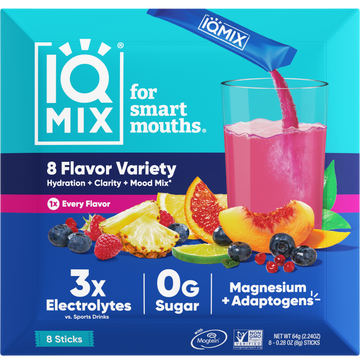Everyone wants to boost their mental performance and safeguard their noggin’s health as they age. But if you ask anyone how much magnesium they get each day, you’ll often hear crickets.
This humble mineral plays an important role in our learning, brain function, mental health, and neuroprotection. Many scientists have an “intense interest” in magnesium thanks to its potential to prevent and treat some of the most pressing conditions in public health and neuroscience.[*]
Yet unlike sodium, calcium, and potassium, you won’t find this electrolyte listed on nutrition facts. So it’s no wonder nearly half of Americans aren’t reaching their recommended daily intake goal.[*]
So let’s dive into the science behind how magnesium works its magic on our brains and find out if you’re getting enough to keep your mind sharp.
The Connection Between Magnesium and Brain Health
Magnesium is involved in over 600 enzyme reactions throughout our body and brain.[*] It regulates blood pressure, insulin metabolism, muscle contractions, and more.[*] It’s so crucial to our brain health that several neurological conditions can be traced back to a magnesium deficiency.
Our brains thrive on magnesium, as studies show that magnesium may:
1. Enhance Neuroplasticity, Learning, & Memory
Neuroplasticity is our brain’s ability to evolve and adapt throughout life. It’s how we form new neurons (brain cells) and strengthen existing ones, which helps us easily learn and retain new intel.[*]
Researchers say magnesium facilitates synaptic plasticity, or the junctions between neurons.[*][*] Enhancing these neural connections empowers us to recall information faster and connect new ideas to boost creativity.
This may be why low dietary magnesium intake is associated with slower thinking.[*] Conversely, higher intake levels are linked to better cognitive function and memory.[*][*] Some findings even suggest that high magnesium intake alone may improve brain power in older adults.[*]
2. Stop the “Vicious Circle” of Stress
Magnesium directly interacts with your primary stress response system. It helps regulate and balance stress hormones (like cortisol) so they don’t run amok.[*]
Researchers believe low levels of magnesium put us at a higher risk for stress. Worse? When we’re stressed, our nerves demand more magnesium, further compounding magnesium deficiencies and stress levels.[*][*]
Interestingly, the most frequently reported symptoms of stress overlap with symptoms of magnesium deficiency: fatigue/tiredness, irritability, anxiety/nervousness, upset stomach, muscle tension, headaches, restless leg syndrome, and sleep troubles.[*]
So adding more magnesium to your diet could crush both issues in one go.
3. Boost Neurotransmitters Tied To Mental Health
Low magnesium levels heighten stress, anxiety, and depression.[*] This may be because magnesium influences key mood-related neurotransmitters, such as:
- Serotonin, which is involved in regulating moods and sleep. When magnesium levels tank, so does serotonin. This raises the risk of depression and anxiety.[*] But magnesium supplements increase serotonin to ensure more happy days.[*]
- GABA promotes relaxation and counteracts stress-related neurotransmitters like glutamate.[*] Low GABA and high glutamate levels are connected to anxiety, depression, and insomnia. Increasing GABA activity with magnesium helps control glutamate to calm your nervous system and reduce stress-induced tension.[*]
Magnesium also affects your NMDA receptors, which are ion channels that allow calcium to enter neurons. If you’re short on magnesium, you can’t control the flood of calcium, which can greatly worsen depression.[*]
All these reasons prove why meeting your magnesium goal may prevent and reduce symptoms of anxiety and depression.[*][*] Clinical trials even reveal that magnesium supplementation is just as effective for your mental health as an antidepressant — without any side effects.[*]
4. Help You Sleep Better and Prevent Migraines
Up to 80% of people with migraine headaches report stress as a trigger.[*] Chronic stress can also impact your sleep. Magnesium can remedy both situations.
Research shows that serum magnesium levels (magnesium in your blood) are significantly lower in people who frequently suffer from migraines.[*] Good news? Studies demonstrate that magnesium supplementation is just as effective as migraine medications for prevention and treatment.[*][*]
Regarding sleep, supplementing with magnesium helped improve overall sleep, time to fall asleep, melatonin levels, and other insomnia markers in older adults (who typically have poor sleep quality compared to younger populations).[*]
5. Combat Inflammation & Oxidative Stress
Our brains are constantly under siege from free radical attacks. These reactive molecules damage our cells, disrupt brain functions, and cause oxidative stress. Magnesium deficiency? It also increases oxidative stress markers.[*]
This repeated cell damage contributes to inflammation and raises our risks of cancer, diabetes, cardiovascular disease, and autoimmune conditions.[*] Chronic brain inflammation is also a hallmark of neurodegenerative diseases like Alzheimer's and Parkinson’s.[*]
So how do you prevent all that? Get more magnesium! It acts as an anti-inflammatory antioxidant, neutralizing free radicals, protecting cells from oxidative damage, decreasing inflammation, and counteracting the negative effects of stress.[*]
6. Act As Your Neuroprotective Shield Against Cognitive Decline
As we age, the risk of mental decline becomes a looming concern. Researchers say prevention is our best hope since there’s no cure for this slippery slope. Thankfully, the neuroprotective effects of magnesium show fantastic promise.
In a recent study of more than 6,000 cognitively healthy participants, those who consumed more than 550 milligrams of magnesium each day had younger brain ages by the time they reached 55 than those with magnesium intakes around 350 milligrams a day.[*]
The study researchers noted that a 41% increase in magnesium intake could lead to less age-related brain shrinkage, which is associated with better cognitive function and a lower risk of dementia in later life.[*]
Another study of over 1,000 middle-aged adults who were followed for more than 15 years revealed that those who consumed the most magnesium earned a nearly 40% reduced risk of developing mild cognitive impairment and dementia than those who got the least.[*]
So how does it work? Several studies demonstrate a connection between a low intake of magnesium and a higher risk of dementia, cognitive impairment, and Alzheimer’s disease.[*]
Boosting brain magnesium lowers oxidative stress and system inflammation, which would otherwise cause neurodegeneration.[*] It also combats the biggest risk factors for dementia: heart disease, type 2 diabetes, and hypertension (high blood pressure).[*][*]
So, Are You Getting Enough Magnesium?
Healthcare experts recommend 400 to 420 milligrams (mg) of magnesium for men and 310 to 360 mg of magnesium for women daily.[*] To meet your RDA, add magnesium-rich foods to your diet, such as:[*]
- Leafy green veggies: spinach, kale, and collard greens
- Nuts: almonds, cashews, and nut butters
- Seeds: pumpkin, chia, and sunflower
- Legumes like peanuts and peanut butter
- Dark chocolate
While whole grains also make the list, they’re often too high in carbohydrates for a low-carb or keto diet.
What Type of Magnesium is Best for Brain Health?
Though there are different types of magnesium on the market, Magtein® (magnesium L-threonate) is the only form proven by clinical trials to increase magnesium levels in the brain.[*]
This patented form of magnesium is highly bioavailable (easily absorbed). It also quickly crosses the blood-brain barrier to deliver all the beneficial effects for your mind we shared today.
💁 Check out everything you need to know about Magtein® next!
Give Your Brain Magnesium Supported By Science
You can’t find magnesium L-threonate naturally in food, so you’ll need to supplement. But if you always forget to take your vitamins, you’re better off snagging Magtein® from:
We dig your brain, so we keep the bad stuff out. You won’t find any gluten, dairy, soy, sugar, or GMOs in our cranium + body boosters.
Don’t Let Your Brain Get Old
Magnesium is a powerful ally in your quest to maintain steady brain power, promote mental well-being, and safeguard against cognitive decline. Unlike those who ignore their magnesium goal, supplementing can empower you to cultivate a sharp, vibrant mind that thrives now and well into your golden years.
🧠 Be smarter than your friends; fuel your mind with the Ultimate Sampler. You’ll get every Magtein®-rich IQMIX and IQJOE flavor (plus every IQBAR!) to make nourishing your noggin as delicious and easy as possible.
Written by Lauren Ciccarelli, a writer and research geek passionate about low-carb nutrition, mental health, and meditation. Her 2,500+ articles empower doers with science-backed tips for leveled-up living.




